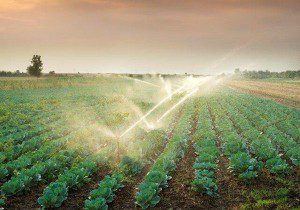Contributing Writer for Wake Up World
As drought persists in California, oil behemoth Chevron has found an new way to dispose of its fracking wastewater: sell it to U.S. farmers in California. About 21 million gallons of wastewater is used on 45,000 acres of crops, which equates to roughly 10% of Kern County’s farmland in the Central Valley.
The program has been in effect for twenty years, due to persistent water shortages in the region. But with the current historic drought now into its fourth year, concerns over the practice of recycling this industrial wastewater are bubbling to the surface, notably because the fresh water that has historically been used to dilute the fracking wastewater is now in short supply — which may in turn increase the amount of petrochemical contaminants found in the water being used for agriculture.
Researchers are worried these toxic chemicals are then making their way into the food supply.
Petrochemical Laced Irrigation
California doesn’t have statewide regulations for recycled wastewater used in agriculture. Instead, permits are issued to local water districts by nine regional water boards. Once a year, water districts are required to provide toxicity data to their water board, but certain components — like heavy metals, radioactive materials and chemicals used in fracking — are excluded due to cost. One water district has only tested for radioactive elements a few times over the last two decades. According to the Los Angeles Times:
“Until now, government authorities have only required limited testing of recycled irrigation water, checking for naturally occurring toxins such as salts and arsenic, using decades-old monitoring standards. They haven’t screened for the range of chemicals used in modern oil production.”
Tests conducted by Water Defense, an independent environmental group, discovered high levels of acetone and methylene chloride in Chevron wastewater intended for agricultural irrigation. The water also contained C20 and C34 — both are hydrocarbons found in oil. Methylene chloride and acetone are solvents used in industrial applications. The former is considered a potential carcinogen.
Scott Smith, the chief scientist for Water Defense, said one sample he took registered at nearly four times the amount of methylene chloride found in an oil-contaminated river during the 2013 ExxonMobil tar sands pipeline spill in Mayflower, Arkansas. That particular spill was deemed a federal disaster, which prompted evacuations and a $2.7-million fine for the company.
Farmers themselves admit that “everyone smells the petrochemicals in the irrigation water,” but believe organisms within the soil will take care of any impurities in the water.
Incredibly, officials don’t know if these toxins are transferred to the food we eat because no one has bothered to test the food being grown with the wastewater.
Carl K. Winter, who studies pesticides and naturally occurring toxins in food at UC Davis, said there are plants that absorb toxins without contaminating the edible parts. Although he adds, “it’s difficult to say anything for sure because we don’t know what chemicals are in the [fracking] water.“
As a letter to the editor of the Los Angeles Times stresses, the practice of using recycled fracking water for agriculture is simply bad business all the way around:
“Chemicals, many of which are known carcinogens, don’t just break down in nature in some type of utopian filter process. If that were the case, we’d have no Superfund sites.
Even if we knew the effects of a specific chemical on a crop, we still would not know the synergistic effects of that same chemical combined with one of the hundreds used as trade-secret ingredients in fracking. Nobody would want water laced with these substances anywhere near their food or their aquifer.
I welcome all the confident businessmen who deal in fracking to dine on these tainted agricultural products and to wash it all down with water from the aquifers that they helped to contaminate.” ~ Kevin Mazzocco, Auberry, California
Article sources:
- http://www.latimes.com/local/california/la-me-drought-oil-water-20150503-story.html
- http://www.newsweek.com/california-farmers-rely-oil-wastewater-weather-drought-319648
- http://www.latimes.com/opinion/readersreact/la-le-0508-friday-fracking-water-20150508-story.html
- http://thinkprogress.org/climate/2015/05/05/3654388/california-drought-oil-wastewater-agriculture/
- http://truthstreammedia.com/2015/05/14/california-farmers-turning-fracking-wastewater-for-irrigation/
Previous articles by Carolanne Wright:
- Chronic Lyme Disease: A Modern Plague the Government Chooses to Ignore
- Monsanto’s Roundup Ready 1000 Times More Toxic Than Glyphosate Alone
- The DARK Act: Monsanto’s Dream Come True, A Waking Nightmare for Clean Food and the Environment
- Big Pharma and Organized Crime — They are More Similar Than You May Think
- Over 100 Scientific Studies Agree: Cannabis Annihilates Cancer
- Emotional Energetic Healing: The Future of Medicine is Here
- Why Every Parent Should Consider Unschooling
- The Greenhouse of the Future: Grow Your Own Food Year-Round With This Revolutionary System
- First U.S. City Produces More Electricity Than It Uses — With 100% Renewable Technology
- Autistic Boy with Higher IQ Than Einstein Discovers Gift After Removal from State-Run Therapy
- Enhance Spiritual, Mental and Physical Well-being with a Pineal Gland Detox
About the author:
I’m Carolanne — a writer, chef, traveler and enthusiastic advocate for sustainability, organics and joyful living. It’s good to have you here. If you would like to learn more, connect with me at Thrive-Living.net or visit Twitter.com/Thrive_Living.

If you've found value in our articles, we invite you to support the release of our brand-new book, "Gratitude Practices for Kids: A Practical Guide for Adults to Instill a Spirit of Appreciation and Positivity in the Next Generation."
"Gratitude Practices for Kids" brings together over 25 innovative and accessible practices designed to enhance gratitude in everyday life. This comprehensive guide is backed by 17 scientific studies, ensuring each concept is grounded in research, underscoring our commitment to nurturing growth, emotional intelligence, and positive interactions between adults and children.
We encourage you to opt for the paperback version to celebrate this new release. Dive into its fresh pages away from digital distractions, allowing you to immerse yourself in the transformative practices it offers.
Over recent years, Wake Up World has faced significant online censorship, which has impacted our financial ability to operate. Moving into book publishing represents a strategic step to secure the ongoing funds needed to continue our mission. By purchasing Gratitude for Kids, you help us keep our content free and accessible to everyone, avoiding needing a paywall. With over 8,500 articles published in the last 13 years, we remain dedicated to keeping our valuable content open to all.









